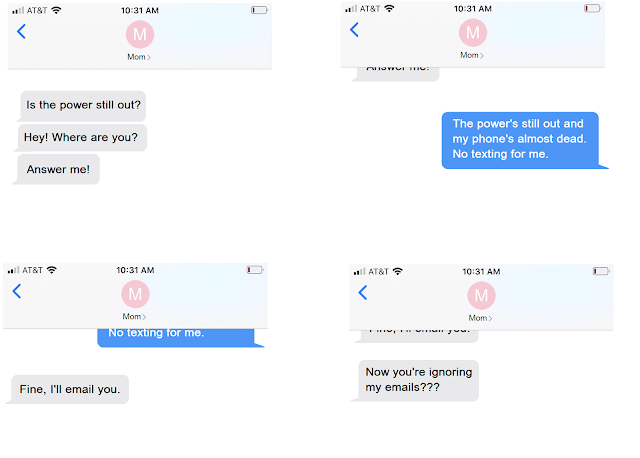Saturday, August 29, 2020
Thursday, August 27, 2020
Cat Pics #1: Tired
Tuesday, August 25, 2020
From The Spamfiles
Look at this. This is not even half of the 85 blog comments I got over the course of just a few minutes! All from the same "lehman kartojo" and all the exact same words. I’m not sure what exactly it says since it’s another language, but considering every other word is viagra, I think we can figure it out.
Part 2 a couple of hours later. The only difference is this one was from "Maddox Pax". It keeps happening every day at about ten thirty in the morning. At one point, I logged in to find I had almost five hundred messages, from a few different addresses, all with the same "Nice! viagra viagra viagra". They seem to be going through every single blog post of mine and adding this same message. I really wish I could block commenters.
Saturday, August 22, 2020
Ignoring
Thursday, August 20, 2020
Language Of Confusion: Times of Day
Tuesday, August 18, 2020
From The Spamfiles
Saturday, August 15, 2020
The New Normal
With my mom.
I did forget my mask once. And now I will never not have her telling me to make sure I have it.
Thursday, August 13, 2020
Language Of Confusion: Pronouns, Part II
We’ve got a bunch more pronouns to look at! This should be fun. For a given definition of fun.
She showed up in the mid twelfth century from the Old English seo, which was also meant that and the as well as she, and also didn’t have the sh pronunciation, so where the hell did that come from? Anyway, seo is from the Proto Indo European so-, which I mentioned a few weeks ago as being the origin of the. Her on the other hand comes from the Old English hire, which, yeah, pronounced like hire. The her hire is actually the dative/genitive form of heo, which meant she before seo did. To sum it up: her is from the word that she replaced.
He comes from the Old English he, which just means he (my eyes are rolling back into my head here). It’s from the Proto Germanic hi-, from the Proto Indo European ki-, from the root ko-, meaning this. Yet not the origin word for this. It is however the origin word for heo, meaning it’s where her comes from. We just replaced the original feminine pronoun with the, and I find that really annoying. And this is also where his and him come from, though there’s no real explanation as to why those are different when her works for both on the feminine side of things.
Next, everyone’s favorite pronoun that’s both singular and plural, they. It showed up in the thirteenth century, and is believed to be Scandinavian in origin. It’s known to be from the Proto Germanic thai and Proto Indo European to-, the origin word for that. Old English actually had plural versions of he and she—kind of like how Spanish has ellos and ellas for plurals—but people just preferred using the neutral they instead, I guess. They and them are from mostly the same origin. Them showed up in the thirteenth century from the Old Norse þeim, which is from thai and to-, and their showed up at the same time from the Old Norse þierra, again, same origin.
Finally, you. It comes from the Old English eow, (pronounced like it’s spelled) you, a dative/accusative plural of þu, thu, where we get thou from. Then that word is from ge, which is actually pronounced ye, and that’s where ye comes from, and all of them are from the Proto Indo European yu, which is just you. Fun fact, although thou and you were different forms of you, thou actually has a different Proto Indo European origin word, tu-, which was the singular form of you, while yu was the plural form. You replaced thou because you was used when addressing someone who was “superior”, then anyone who was a stranger (just to be polite), then just everyone, and by the mid fifteenth century, it was considered rude to address someone with thou unless they were a child or someone you were really close with. Your really isn’t all that different in origin. It’s from the Old English eower, your, and that’s from the same place as eow. No real mystery in that part, unlike with the whole thou thing.
Sources
University of Texas at Austin
Linguistic Research Center
University of Texas at San Antonio’s page on Proto Indo European
language
Tony Jebson’s
page on the Origins of
Old English
Tuesday, August 11, 2020
From The Spamfiles
You know what? More spammers need to be offering to be your buddy. We could all use more buddies right now.
All legitimate charity offerings address you as beneficiary, and include lots of exclamation points.
Here’s what bugs me about these: the strikethrough over the 18. That seems to imply that they don’t want people 18 and over, which of course means this adult dating list is… for children?!!?!
Army majors are always contacting random people for investment proposals while they’re supposed to be out in the field. This kind of thing happens all the time. Anyone who tells you otherwise is a liar.
If you want to keep your photos private, maybe don’t go emailing them to everybody. Also, there’s that 18-strikethrough again. WHAT ARE YOU TRYING TO SAY???
Just posting this one because I find the name “Hecklinger” to be strangely hilarious. What the Hecklinger are you trying to say? Go to Hecklinger! To Hecklinger and back again.
Seriously, we have to start using it as slang. Who’s with me?













